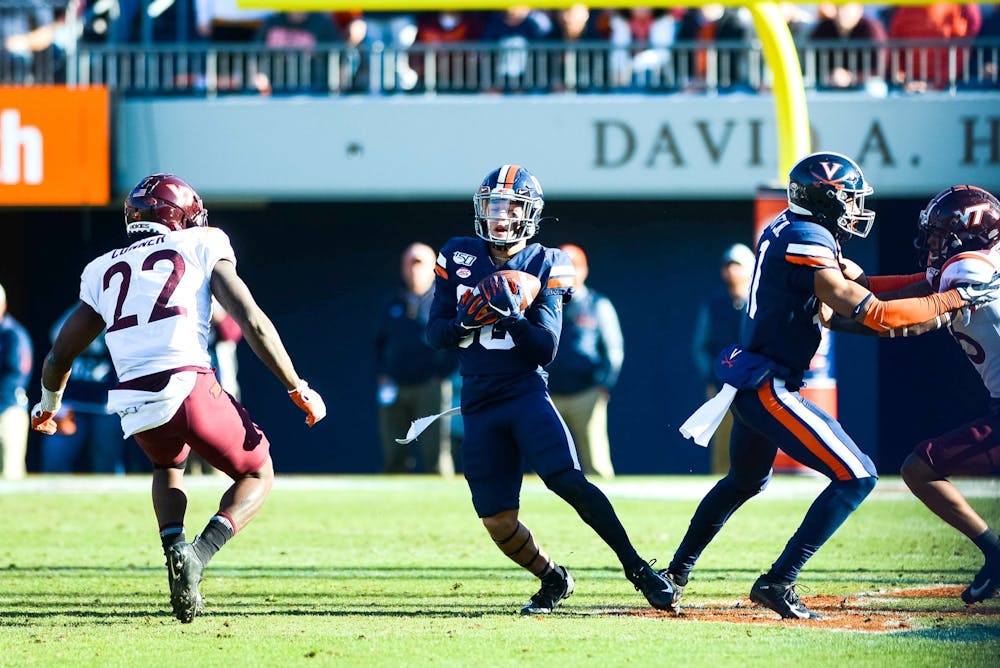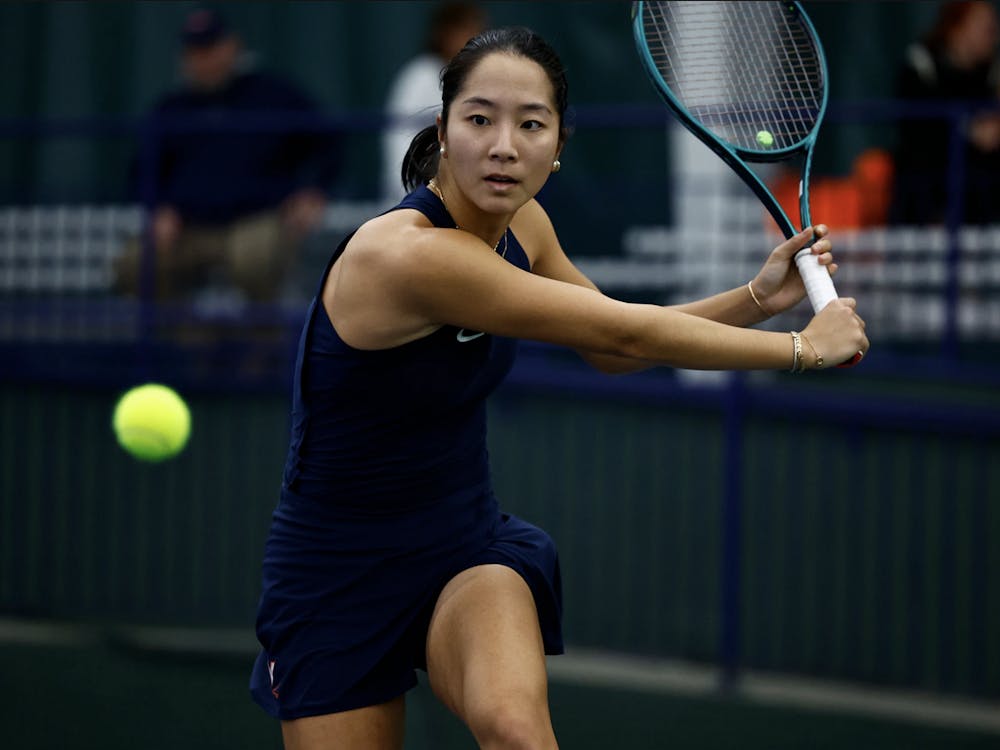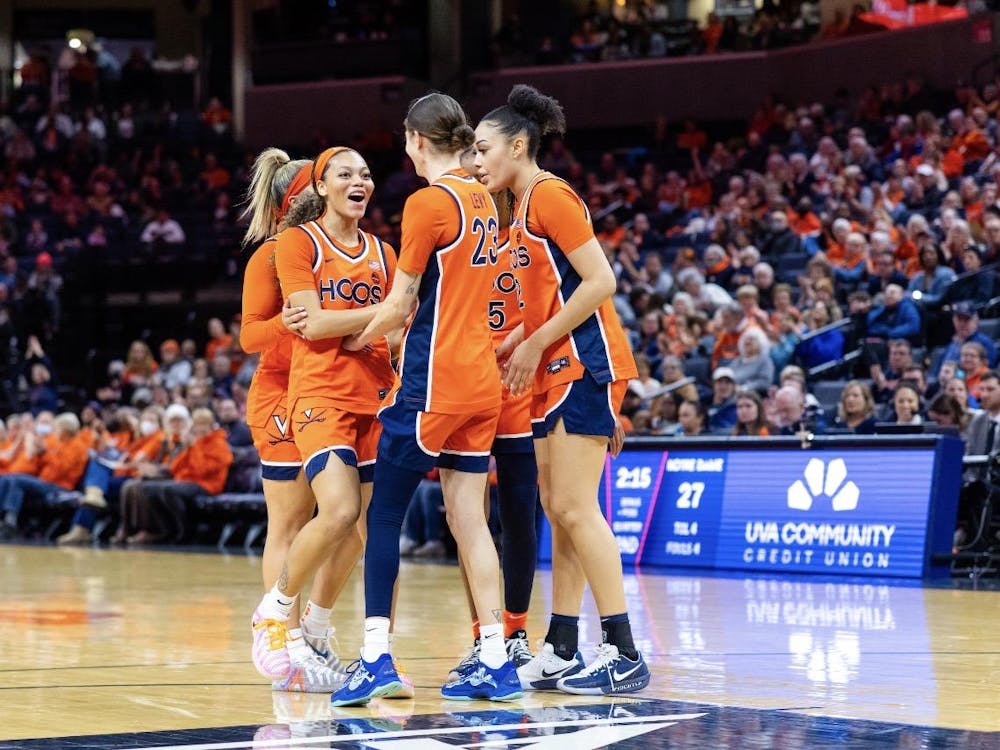Following a tumultuous season that saw the battle for the Commonwealth Cup initially moved from November to September, Virginia and Virginia Tech now find themselves facing off in December for the first time in history following the game’s postponement in September. Nonetheless, the stakes for the 102nd meeting between the storied rivals remain high, with the Commonwealth Cup — and the bragging rights that come with it — up for grabs.
Last season saw the Cavaliers defeat the Hokies for the first time since 2003, ending Virginia Tech’s 15-game winning streak in nail-biting fashion, 39-30. During that game, former Virginia quarterback Bryce Perkins was the X-factor for the Cavaliers, passing for 311 yards and rushing for 164 yards with 3 total touchdowns, while former wide receiver Hasise Dubois was also a major contributor too, recording four receptions and 139 receiving yards. This year, without Perkins and Dubois, the Cavaliers will need new players to step up if they want to take down their in-state rival.
Breaking down the Virginia offense
Following his return from a concussion suffered in the Cavaliers’ third game of the season against NC State, sophomore quarterback Brennan Armstrong has been electric, leading Virginia on a four-game winning streak headlined by a nail-biting 44-41 win over then-No. 15 North Carolina. While he struggled to connect with his receivers early in the season, the Shelby, Ohio native has progressed immensely, finding wide receivers freshman Lavel Davis Jr. and senior Ra’Shaun Henry to be tried and trusted targets. On the ground, Armstrong has caused problems for defenses, totaling over 300 yards across his last four games.
Out wide, while senior wide receiver Terrell Jana was initially assumed to be the Cavaliers’ No. 1 receiver, the spotlight has now been on Davis Jr., who is a contender for the freshman All-American team despite missing a couple games due to injury. Davis Jr.'s 6-foot-7, 210-pound frame has allowed him to tower over opposing defenders with ease and his safe hands have made him a prime deep threat for Armstrong, tallying 440 receiving yards and five touchdowns. The Dorchester, S.C. native should be a challenge for the smaller Hokie cornerbacks including juniors Armani Chatman and Brion Murray.
Beyond the receivers, running backs junior Wayne Taulapapa and senior Shane Simpson have been solid in the backfield. Taulapapa is a strong veteran runner that isn’t afraid of contact — which should bode well against an experienced Virginia Tech front seven that includes senior linebacker Rayshard Ashby and junior linebacker Dax Hollifield — while Simpson has great speed and agility that helps him on outside runs and short pass plays. However, in the past two games, the Virginia backfield has been quiet, totaling just 53 rushing yards between Simpson and Taulapapa with Armstrong dominating the running and passing games. Noting the strength of Ashby and Hollifield at the line, expect Coach Bronco Mendenhall to only feature his running backs more if Armstrong is unable to make headway at the start.
Beyond the skill positions, Virginia’s offensive line has markedly improved from last year, allowing just 1.78 sacks per game compared to 2.93 just a season ago, giving Armstrong time to find his favorite targets. However, with Virginia Tech averaging 3.20 sacks per game this season in part to the ever-potent duo of Ashby and Hollifield, the battle at the line of scrimmage will be one to watch all Saturday night.
Breaking down the Virginia defense
Defensively, the Cavaliers have taken a step back from last year, notably allowing 520 passing yards to Boston College junior back-up quarterback Dennis Grosel in their previous game. The run defense, however, has been solid despite the loss of sophomore nose tackle Jowon Briggs to the transfer portal, as the Cavaliers have allowed just 125.9 rushing yards per game.
Following senior outside linebacker Charles Snowden’s injury in the Abilene Christian contest, junior outside linebacker Noah Taylor will be tasked with keeping the Virginia Tech starting quarterback — which depends on the status of junior quarterbacks Hendon Hooker and Braxton Burmeister— in the pocket and using his length to tip balls and disrupt the Hokies’ passing game. Furthermore, although Hooker — the starter in last year’s game — had his only career game with 300-plus passing yards against Virginia in 2019, Snowden and Taylor helped limit his effectiveness on the ground, holding him to just 44 rushing yards on 21 attempts. With Snowden out, Taylor will have to carry the load Saturday — something that the Maryland native is more than capable of accomplishing.
At inside linebacker, sophomore Nick Jackson and senior Zane Zandier are a formidable duo, with Jackson leading the team with 98 tackles and Zandier right behind him at 74. Zandier, Jackson and defensive linemen seniors Matt Gahm, Adeeb Atariwa and Mandy Alonso will line up against a dynamic threat in Khalil Herbert, Virginia Tech graduate transfer running back. Herbert is a true athletic specimen, boasting the ability to shed tackles with ease and sprint away from defenders with blinding speed. Overall, with any of the dynamic three Virginia Tech quarterbacks and Herbert in the backfield, the Virginia front seven will have to stay on their toes in order to quell a potent Hokie rushing attack.
Finally, the Cavaliers’ secondary has arguably been the weakest link on the team, despite returning seniors 2019 third-team All-ACC safety Joey Blount and cornerback Nick Grant. Grant covered Hokie leading receiver Tré Turner during the 2019 rendition of the Commonwealth Cup and struggled at times, with Turner posting seven receptions for 134 receiving yards and one touchdown. Turner has solid speed — outrunning Grant on a 61-yard touchdown last year — and has exceptional route-running abilities. With Grant having struggled with quick receivers this season, Blount and the Spotsylvania, Va. native will have to communicate well in order to combat Turner’s strong play-making abilities.
Virginia’s keys to the game
Neutralize Virginia Tech’s running game
The Hokies come into the Commonwealth Cup with a lot of questions on offense. The top two quarterbacks on the roster — Hooker and Burmeister — left Clemson’s game with injuries, and both their statuses remain in the air for Saturday’s matchup. Should Hooker’s and Burmeister’s injuries keep them out of the clash, Virginia Tech would turn to freshman Knox Kadum, who has never started a game at the collegiate level. Regardless of who has been under center for the Hokies over the recent two week stretch, the unit has severely struggled, registering just 24 points across their last two games. In games with Hooker and Burmeister this year, Coach Justin Fuente has relied on the run for the majority of the offensive production. Should an unseasoned Kadum get the nod, the reliance on the running game will grow even stronger, in an attempt to ease the young quarterback into the game.
The Hokies have the weapons to make noise on the ground, however. First, all three quarterbacks have dual-threat abilities, so regardless of who gets the start, the quarterback running game will be implemented. Additionally, Herbert, who some early on believed could make a run at a Heisman trophy this season, has been impressive all season. The former Kansas transfer has 1,020 yards on just 134 attempts this season, to go along with seven touchdowns. Stopping him will be the number one priority for the Cavalier defense. In the five Hokie losses Herbert has played in, he averaged just 69.8 rushing yards per game and had only three touchdowns. However, in the four victories, Herbert amassed 150.3 rushing yards per game and four touchdowns. Should co-defensive coordinators Mike Howell and Kelly Poppinga find a way to neutralize Herbert’s impact, the pressure on the Hokie passing game will open up many opportunities to force mistakes. Virginia certainly has the tools to make a stand, with Zandier and Jackson playing the linebacker position as some of the best in the ACC.
Be aggressive against a struggling secondary
After an already-thin Hokie secondary lost projected first round pick Caleb Farley before the season due to COVID-19 concerns, Virginia Tech has seen opposing offenses perform well against them. The unit has allowed 265.9 passing yards per game, which is good for 102nd out of 127 eligible teams in the NCAA database. To make matters worse for new defensive coordinator Justin Hamilton, Armstrong and the Cavalier offense has been firing on all cylinders as part of a four-game win streak. During this win streak, Armstrong has averaged 270.3 yards passing per game to go along with 77 yards per game on the ground. In that same time span, the sophomore has accounted for 13 total touchdowns. Needless to say, Armstrong is finding his rhythm at the perfect time. Against a struggling secondary, offensive coordinator Robert Anae should give his young quarterback the green light to be aggressive on offense. With weapons like Davis Jr., Henry and junior halfback Billy Kemp IV elevating their play alongside Armstrong in the past few weeks, the pieces are in place for the Cavaliers to have their way on offense. If Virginia can get on the board early and put the pressure on Virginia Tech’s offense, its likelihood of the Hokies staying with the run so often decreases, so keeping Herbert out of open lanes and forcing a weak Hokie passing attack to make plays will be huge.
Do not hesitate to send blitzes
In an otherwise down year for the Hokies, the offensive line has been relatively productive, allowing just 22 sacks in nine games. Spearheaded by junior offensive lineman Christian Darrisaw, who is a projected first round pick in the upcoming draft, the unit has been impressive in pass protection and also in the run game for Herbert. Against Boston College, Virginia did a good job mixing in blitz packages, leading to a four-sack performance from the unit. The Cavaliers will have to replicate that defensive mindset against Virginia Tech. The Hokies do not usually run deep passes and rely on their run game to open up a lot of their options on offense. Thus, packing the box more and sending extra defensive backs and linebackers should not result in many defensive breakdowns. Especially with uncertainty at the quarterback position, expect Virginia to make the Hokie backfield uncomfortable early and often. The loss of numerous key pieces in the front seven further makes it critical that Virginia sends pressure in more creative ways to keep the offense guessing. While it is a risk leaving a struggling secondary in one-on-one coverage in blitz packages, it is worth testing the deep passing game for the Hokies, which has not been the primary component for the offense.
Overall, all signs point to a dead heat between the Cavaliers and Hokies, continuing the trend of heart-stopping finishes from the last two years. If Virginia wants to edge the Hokies out to keep the Commonwealth Cup in Charlottesville, Armstrong will have to command the offense with confidence and the Cavalier defense will need to keep the dynamic Hooker in check.
The battle for the Commonwealth Cup is slated to kick-off Saturday at 8 p.m. in Blacksburg. The game will be televised on the ACC Network.







